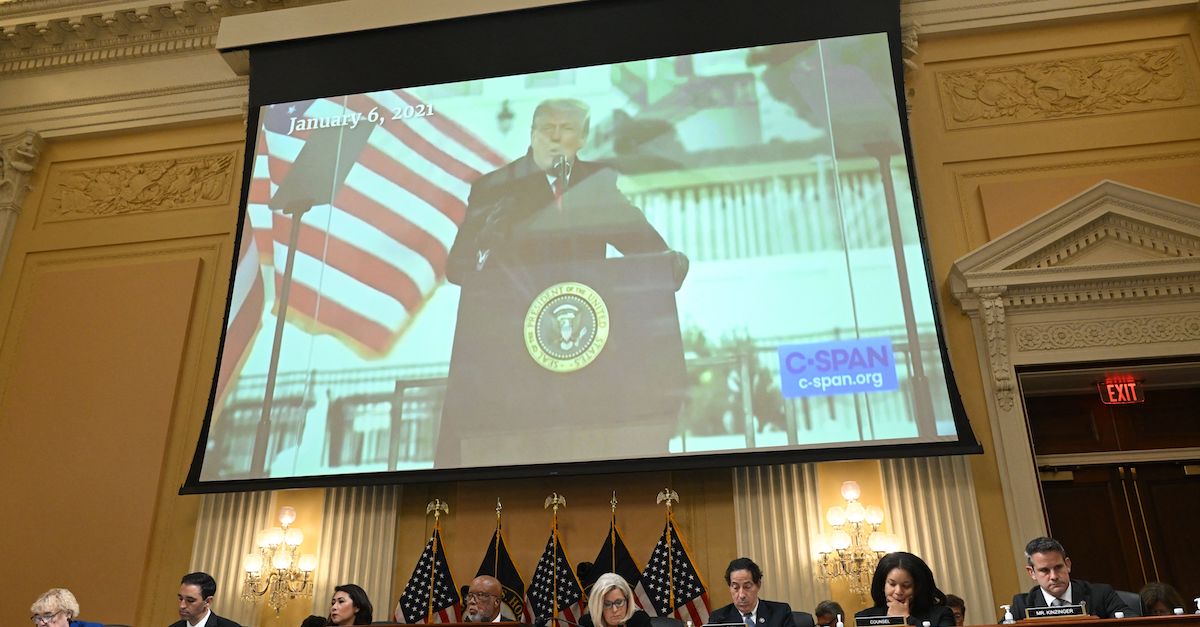
An image of former US President Donald Trump is shown during a full committee hearing on the Jan 6th investigation on Capitol Hill on July 12, 2022, in Washington, D.C.
Putting an end to one of the key controversies that sparked debate among the panel, the Jan. 6th Committee reportedly has decided to make criminal referrals when the lawmakers release their long-anticipated report.
First reported by CNN, the criminal referrals would carry no legal weight, and the Department of Justice’s special counsel Jack Smith will be the final arbiter over whether to try to bring charges against former President Donald Trump. The Committee has made a handful of criminal referrals before to the Justice Department, which decided to prosecute Steve Bannon and Peter Navarro for contempt of Congress — but to the committee’s dismay, passed on charges for Mark Meadows and Dan Scavino.
The committee has also subpoenaed Trump, who filed a lawsuit in response.
The Jan. 6th Committee did not immediately respond to Law&Crime’s email requesting comment.
The largely symbolic nature of the referrals reportedly sparked intense debate inside the Committee. Earlier this year in April, Politico reported that those opposed to the referrals feared that such an action would confer no real benefit and arm the Justice Department’s critics with claims of political motivations.
Rep. Adam Schiff (D-Calif.), the lead prosecutor in Trump’s first impeachment and a Jan. 6th Committee member, noted to Politico that a federal judge already found it “more likely than not” that the former president committed two felonies: obstruction of an official proceeding and conspiracy to defraud the United States. That decision, and another like it by U.S. District Judge David O. Carter, would resonate more strongly with the Justice Department than a congressional referral, some panelists reportedly believed.
It is unclear what changed the committee’s mind.
According to CNN, a subcommittee of members was responsible for determining how the larger committee could present evidence of possible obstruction, possible perjury, possible witness tampering, and criminal referrals to the Department of Justice. Those members were Schiff, committee Vice Chair Rep. Liz Cheney (R-Wyo.), Rep. Jamie Raskin (D-Md.), Rep. Zoe Lofgren (D-Calif.).
The committee has long alleged that Trump was at the head of a concerted effort to stay in power after losing the 2020 presidential election to Joe Biden. Committee members made their case over nine hearings which featured excerpts from hundreds of interviews and depositions from those in the former president’s orbit.
At the same time, the Justice Department has engaged in its own expansive pursuit of rioters who participated in the Jan. 6 melee, arresting some 900 people and obtaining multiple felony convictions. High-ranking members of the right-wing Oath Keepers militia group, including founder Stewart Rhodes — who repeatedly called on Trump to invoke the Insurrection Act ahead of Biden taking office — have been convicted of seditious conspiracy for plotting to use force to block Congress from certifying the 2020 results.
The trial also shed light on the links between right-wing extremist groups seen at the Capitol on Jan. 6th and Trump administration insiders like Roger Stone. The Republican operative was such a fixture for the Oath Keepers and the Proud Boys that both had encrypted chat rooms labeled “F.O.S.,” short for “Friends of Stone.”
If the committee does refer Trump for criminal prosecution, the former president’s allies will likely depict it as one of multiple efforts to block him from taking office in 2024.